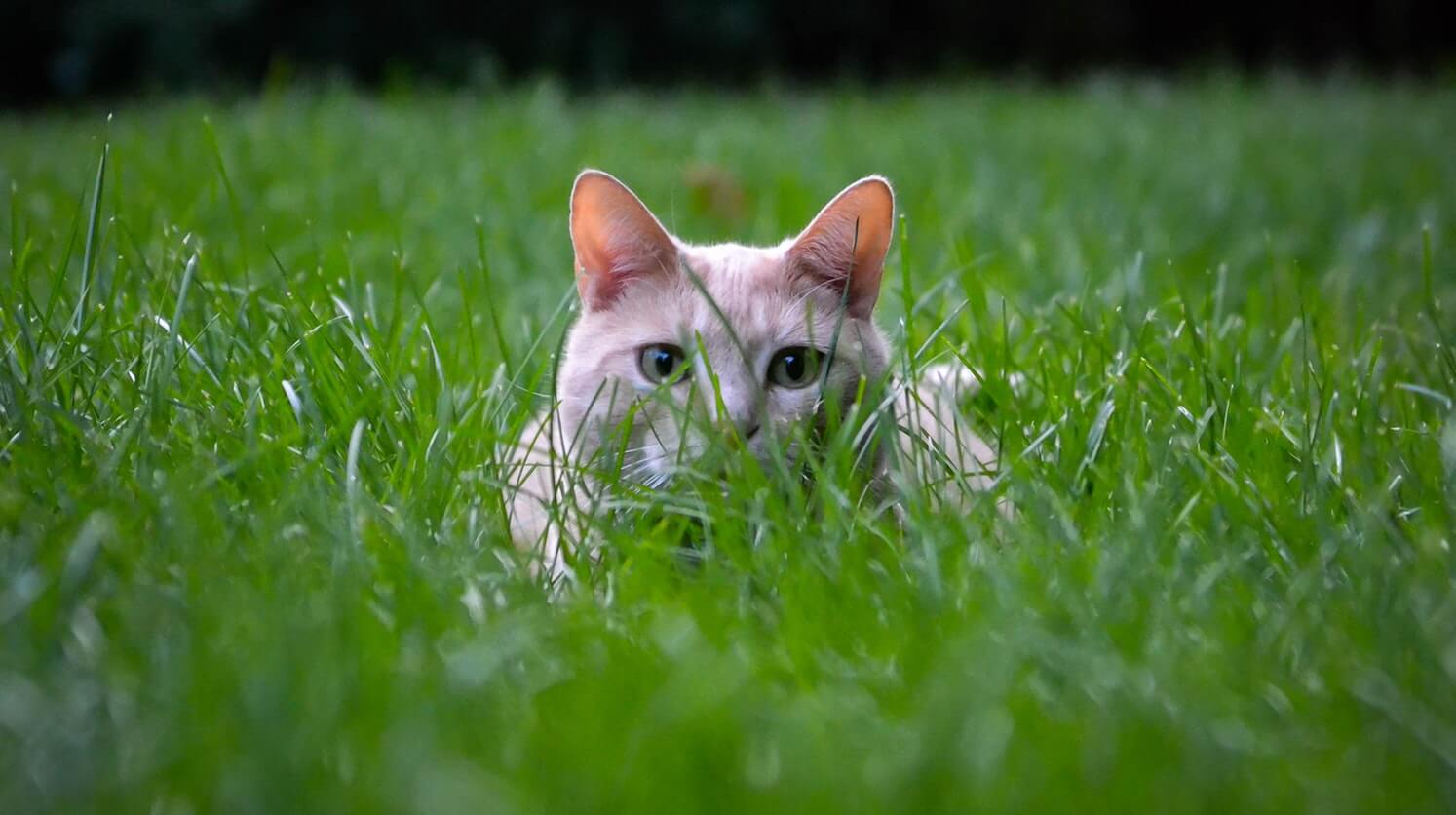
Animal lovers who have feline pets surely have noticed their cats grazing like a horse, cattle or any other graminivores. Individual members of the animal kingdom are herbivores, which means that they’re adapted anatomically and physiologically to feed on plants. More specifically, some herbivores consider grass as their primary food source. They have digestive systems that can ingest high levels of cellulose which other animals have a hard time digesting.
Cats, on the other hand, are carnivorous. This means that meat of other animals are the primary source of the energy and nutrients that they need. Cat food contains some aspects of animal meat to provide the vitamins and fatty acids that felines require.
Table of Contents
Grass Helps Cats With Indigestion
It is common to see cats vomiting right away the grass that they ingest but still eat it again. It might seem like they enjoy throwing up, so they keep consuming what they will eventually even throw up. Another assumption is they just do not learn the lesson that they learn firsthand.
One of the reasons cats eat grass is to help them with digestive system problems. The vomiting reaction that their bodies produce helps them eliminate matters in their tummy that are making them feel sick. This happens a lot because cats consume their prey entirely including inedible portions such as the fur and feathers. Purging themselves out of these will bring comfort to their stomach and save money and time for the pet owner.
Grass Acts As A Natural Laxative
When cats experience indigestion, grass serves as a tool to loosen their stool and relieve them from the pains of constipation. These felines throw up fur balls on a regular basis and sometimes consume them accidentally such as when grooming themselves. Their digestive organs cannot break these furs down, creating great haywire in the cats’ tummies. In such cases, the grass is beneficial for cleaning out the digestive system. It is also observed that the broad variety helps as a laxative. On the other hand, the narrow type helps in settling an upset feline tummy. Both variants are found to be effective in both the digestion and excretion processes.
Grass Juice Is Good For The Cat’s Body
Grass actually has something good for cats in the form of the folic acid contained in its juice. This is identical to the mother’s milk, which is the best source of nutrients for a newborn baby. Folic acid is an essential requirement for hemoglobin production in a cat’s body. And hemoglobin facilitates oxygen movement in the blood.
Some Cats Have OCD
Animals, like humans, develop some psychological conditions as well, and one of these is an obsessive-compulsive disorder. This can involve obsession over certain items like grass and other kinds of plants, fabric, plastic, and other non-food items. The cat is overpowered with the compulsion to chew something, so it is not able to stop itself.
The act of chewing something helps the cat achieve some form of comfort and relaxation. Without anything to chew, cats with this kind of OCD will end up feeling very uncomfortable. They will also feel frustrated and even angry. While behavior modification is the usual solution for such condition among humans, it is observed to be ineffective among cats.
Grass Entertains Cats
Plants are entertaining for animals as their leaves dangle in the air and sway with the breeze. Movements catch their attention and get them entertained. This is especially true for younger cats who are easy to be enticed by such stimuli. Because of the reaction of owners to cats’ eating grass, the act is easily associated with attracting the owner’s attention.
Is Grass Good Or Bad For Cats?
On a general note, grass ingestion is not an entirely bad thing for cats. The feline population accomplish specific goals and receive some benefits from grass and the act of consuming it. Whether for the internal organs, mental health or simple relief from some pain, grass has its perks. There is no need to worry about consuming too much considering how too much of something is always bad. It is natural for cats to be able to self-regulate the amount of grass consumed as per their requirement. They have an understanding of what they need and how much based on what they need it for.
What Can Cat Owners Do?
It is not possible to keep the pets inside the home at all times. Like humans, they need fresh air and sunlight as sources of vitamins and minerals. Their bodies and brains need these minerals for normal functioning. Locking them up entirely can result in problems with their health. This is not at all advisable in dealing with grass consumption.
In fact, one does not have to worry if they enjoy their share of the yard grass every now and then. They will naturally regurgitate it anyway if their bodies cannot accept it in their system.
One should start to worry if the pets start to consume more grass than usual one day. Another case to worry about is if the cats are starting to eat grass daily or even just more frequently. The difference in the behavior is sure to stem from something unusual, which needs to be checked.
Cat owners should be wary of the dangers that are present in plants. One of which is in the form of fertilizers and pesticides. These chemicals are generally useful and beneficial for the plants in one way or another. However, they are toxic to humans and animals alike.
Another danger comes from individual plants that are naturally harmful to felines. There is nothing that can be done about this as it is in their natural component. Owners just need to take responsibility for eliminating them and making them inaccessible for the pets. These plants include chrysanthemum, lilies, oleander, English Ivy, tulip bulbs, amaryllis, thymes, and azaleas to name a few.
Conclusion
Since it is not possible to completely stop cats from feeding on plants, one can stop focusing on that part. It is best to focus on keeping the animals save by ensuring that the surrounding plants are free from toxins. Growing grass indoors is another option so one will be able to regulate the quality consumed by the pets.
There are pet grasses sold officially in pet stores that are safe for cats such as barley, rye, and wheat. They can be strategically placed inside the house for the pets to enjoy when they like. They can also come in the form of a cat’s treat.
You May Also Interested In:
- 10 Best Wet Cat Food Reviews and Buyer’s Guide
- 10 Healthiest and Best Dry Cat Foods Reviews with Guide
- 10 Best Automatic Cat Feeders Reviews and Guide
Share this:
- Click to share on Twitter (Opens in new window)
- Click to share on Facebook (Opens in new window)
- Click to share on Tumblr (Opens in new window)
- Click to share on Pinterest (Opens in new window)
- Click to share on Reddit (Opens in new window)
- Click to share on Telegram (Opens in new window)
- Click to share on WhatsApp (Opens in new window)
- Click to print (Opens in new window)
